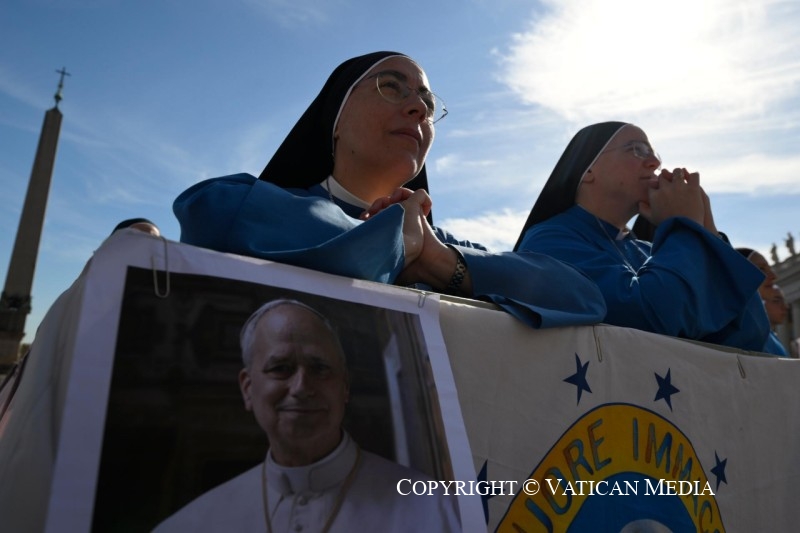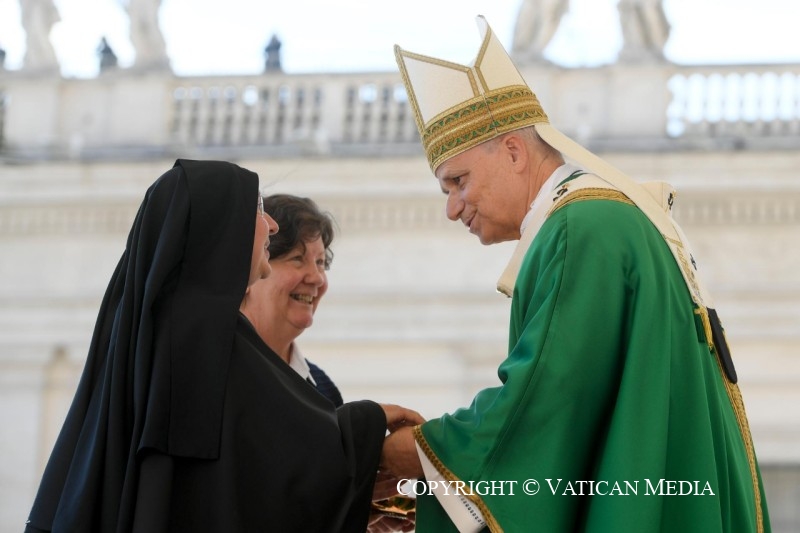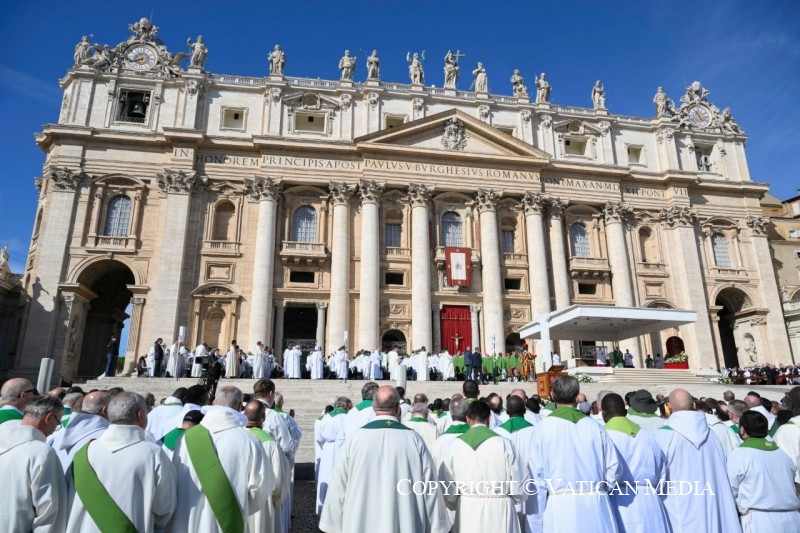Homily by Pope Leo XIV
“Ask, and it will be given you; seek, and you will find; knock, and the door will be opened for you” (Lk 11:9). With these words, Jesus invites us to turn with trust to the Father for all our needs.
These are also the words we listen to as you gather from all over the world to celebrate the Jubilee of Consecrated Life. As men and women religious, monks, nuns and contemplatives, members of secular institutes and of the Ordo virginum, hermits, and those belonging to “new institutes,” you have come to Rome to undertake the Jubilee Pilgrimage together. You have come to entrust your lives to the same mercy to which, through your religious profession, you once committed yourselves to bear witness, because living out your vows means abandoning yourselves like children into the arms of the Father.

“To ask,” “to seek” and “to knock.” These expressions of prayer, mentioned by the evangelist Luke, are attitudes that are familiar to you. Through living out the evangelical counsels, you are accustomed to asking without demanding, always docile to God’s action. It is no coincidence that the Second Vatican Council speaks of vows as a useful means of “deriving more abundant fruit from baptismal grace” (Lumen Gentium, 44). “To ask,” in fact, is to recognize, through poverty, that everything is a gift from the Lord and to give thanks for it. “To seek” is to open oneself, through obedience, to discovering each day the path we must take on the journey towards holiness, following God’s plans. “To knock” is to ask for and to offer the gifts we have received to our brothers and sisters with a chaste heart, striving to love everyone with respect and generosity.
We could read the words that God addresses to the prophet Malachi in the first reading in the same light. He refers to the inhabitants of Jerusalem as “my special possession” (Mal 3:17) and tells the prophet: “I will spare them as parents spare their children” (ibid.). These expressions remind us of the love with which the Lord has first loved us in calling us. It is an opportunity, especially for you, to reflect on the free gift of your vocation from the origins of your congregation to the present day and from the first steps of your personal journey to this moment. First and foremost, we are all here because God has willed it, and has chosen us from the very beginning.
“To ask,” “to seek,” and “to knock” also means reflecting on our own lives, bringing to mind and heart what the Lord has achieved over the years by multiplying talents, strengthening and purifying faith, and fostering generosity and freedom in charity. Sometimes this has been achieved in joyful circumstances, and at other times in ways that are more difficult to understand, perhaps even through the mysterious crucible of suffering. At all times, however, we find ourselves in the embrace of that paternal goodness that characterizes what he does in us and through us, for the good of the Church (cf. Lumen Gentium, 43).

This brings us to a second reflection: God as the fullness and meaning of our lives. For you — for us — the Lord is everything. He is everything in different ways: as Creator and the source of existence, as love that calls and challenges, as the strength that impels and inspires us to give. Without him, nothing exists, nothing makes sense, nothing is worthwhile. Your “asking,” “seeking,” and “knocking,” both in prayer and in life, has much to do with this truth. In this regard, Saint Augustine describes God’s presence in his own life using beautiful imagery. He speaks of a light not bound by space, a voice that never fades, food that is not lessened by eating, and a hunger which is never satisfied, and he concludes: “This is what I love when I love my God” (Saint Augustine, Confessions, 10.6.8). These are the words of a mystic, yet they resonate with our own experience. They reveal the longing for infinity that dwells in the hearts of all man and woman. For this reason, the Church entrusts you with the task of being living witnesses to God’s primacy in your lives. By stripping yourselves of everything, you help the brothers and sisters you meet to cultivate this friendship themselves.
After all, history teaches us that an authentic experience of God always gives rise to generous outpourings of charity. This was the case in the lives of your founders and foundresses, men and women who were in love with the Lord and therefore ready to become “all things to all people” (1 Cor 9:22), without distinction, in the most varied ways and situations.
It is true that today, as in the time of Malachi, some say, “It is vain to serve God” (Mal 3:14). This way of thinking leads to a genuine paralysis of the soul. We end up settling for a life made up of fleeting moments, superficial and intermittent relationships, and passing fads — things that leave a void in our hearts. This is not what we need in order to be truly happy. Instead, we need consistent, lasting and healthy experiences of love. Through the example of your consecrated life, you can be likened to the flourishing trees we sang about in the responsorial psalm (cf. Ps 1:3), spreading the “fresh air” of authentic love throughout the world.

I would like to consider one final aspect of your mission. We heard the Lord say to the inhabitants of Jerusalem, “The sun of righteousness shall rise with healing in its wings,” (Mal 4:2) inviting them to hope for a fulfillment of their destiny beyond the present moment. This is a reference to the eschatological dimension of Christian life, which calls us to be engaged in the world, while at the same time constantly striving towards eternity. It is an invitation for you to prolong the “asking,” “seeking,” and “knocking” of your lives through prayer to the eternal horizon that transcends the realities of this world. To orient them toward that Sunday without sunset when “all humanity will enter into… [God’s] rest” (Roman Missal [Italian edition], Preface for Sundays in Ordinary Time X). In this regard, the Second Vatican Council entrusts you with a specific task when it says that consecrated persons are called in a special way to bear witness to “future goods” (cf. Lumen Gentium, 44).
Dear brothers and sisters, the Lord, to whom you have given everything, has rewarded you with such beauty and richness, and I would like to urge you to treasure and cultivate what you have received. Finally, let us recall the words of Saint Paul VI: “Keep,” he wrote to religious, “the simplicity of the ‘least ones’ of the Gospel. May you succeed in discovering this anew in an interior and closer relationship with Christ and in your direct contact with your brethren. You will then experience through the action of the Holy Spirit the joyful exultation of those who are introduced into the secrets of the kingdom. Do not seek to be numbered among the ‘learned and clever’… Such secrets are hidden from these. Be truly poor, meek, eager for holiness, merciful and pure of heart. Be among those who will bring to the world the peace of God” (Saint Paul VI, Apostolic Exhortation Evangelica Testificatio, 29 June 1971, 54).
Source: vatican.va





